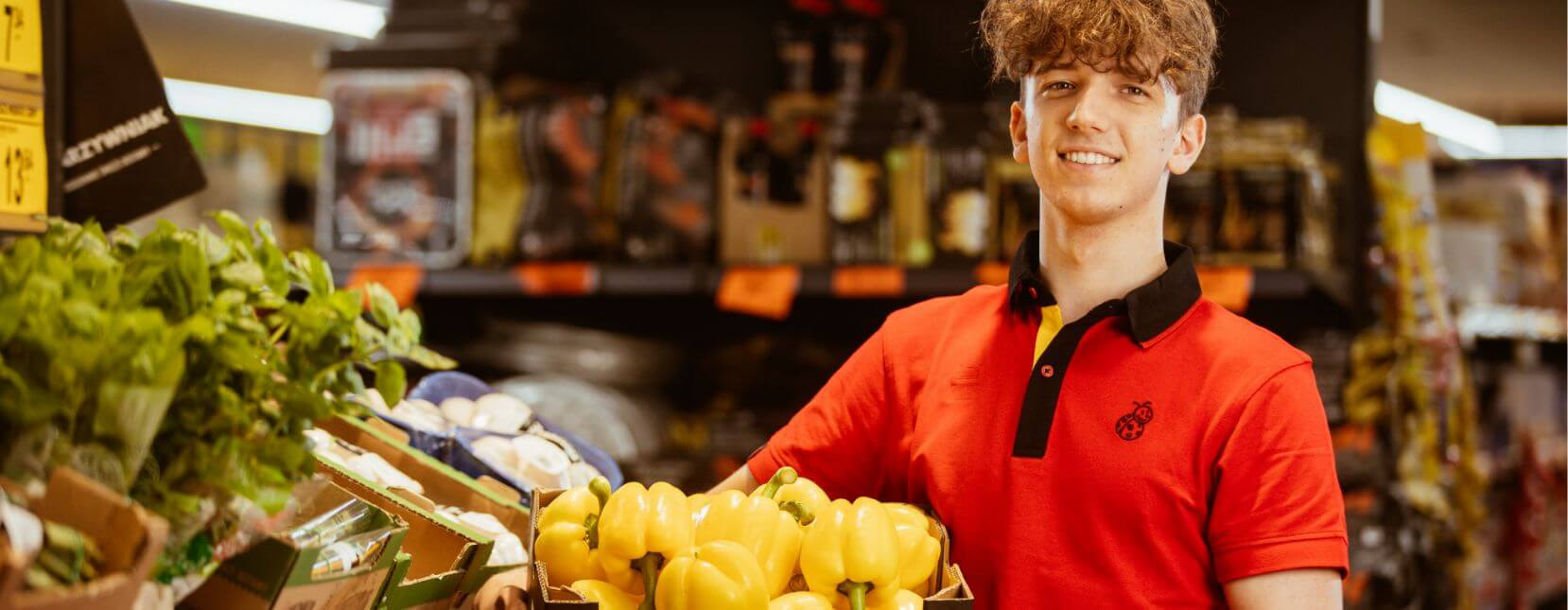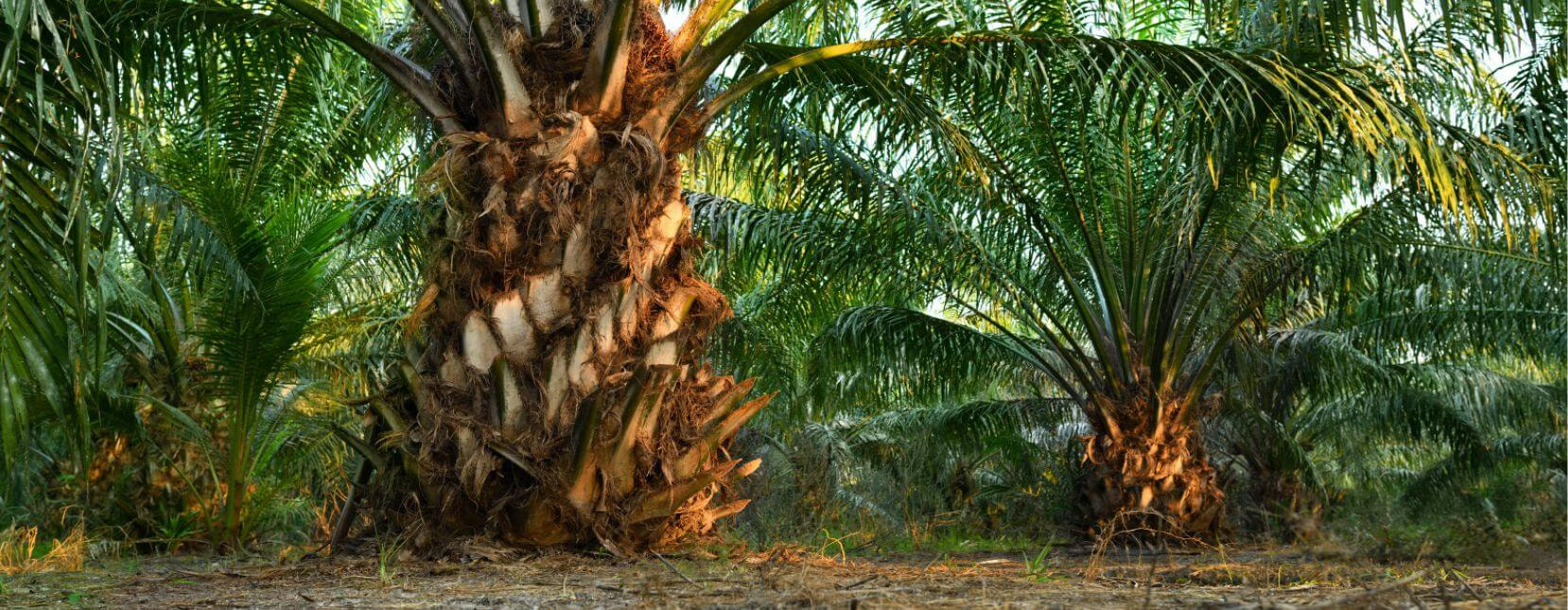Sustainable supply chain

Biedronka’s responsibility commitments for 2021–2023
| Commitment | Progress of strategy implementation | Implementation stage | |
|---|---|---|---|
| 1. | Guarantee that at least 90% of Biedronka’s purchases of food products are sourced from local suppliers. | 93% of food products were sourced from local suppliers. | 100%  |
| 2. | Increase sales of Private Brand and/or perishable products and packaging with sustainability certification to 7% of the total sales of these product categories by 2023. | 16.2% of Private Brand and perishable products were certified as sustainable. | 100%  |
| 3. | Carry out environmental audits to at least 20% of Private Brand and perishables suppliers with a purchase volume greater than 1.1 million euros in 2021-2023 period. | Environmental audits were carried out to 22% of suppliers of Private Brand and perishable products. | 100%  |
| 4. | Ensure the annual application of the Sustainable Agriculture Manual in new farms in Poland, to achieve a minimum average sustainability index of 3.7 points (on a scale of 1 to 5, in which 5 is the maximum rating) for farms with at least two assessments. | The achievement of the target has been postponed to the coming years. | Partially achieved |
| 5. | Contribute to The Consumer Goods Forum's (CGF) Forest Positive Coalition of Action commitments. Within the scope of our Private Brand and perishable products and for each of the commodities considered, the following goals were defined: | ||
| Palm Oil: Continue to ensure 100% RSPO-certified palm oil and work on progressively including derivatives. | 100% of palm oil is RSPO certified. | 100%  | |
| Soy: : Reduce soy of unknown origin to 20%, and soy from countries at risk of deforestation to 20%, or ensure that it is RTRS or ProTerra certified. | 6% of soy of unknown origin and 73% from countries with risk of deforestation, without RTRS or ProTerra certification. | Partially achieved | |
Paper and Wood: ensure certification (FSC, PEFC or SFI) of virgin fibres in:
| 95% certyfikowanych włókien pierwotnych w produktach i 73% w opakowaniach. | 100%  | |
| Beef: Reduce unknown origins to below 8% and if beef is sourced from Brazil, engage with suppliers to ensure they have a deforestation policy in place. | 0% of beef from Brazil. 100% of JMP's Private Brand beef is of known origin. | 100%  |
Relationship with suppliers
We want to provide our customers with access to high-quality products at affordable prices and encourage them to follow healthy eating habits and lifestyles. We place emphasis not only on providing high quality, safe and valuable products, but also on taking care of the entire product life cycle, whilst protecting employees and the environment during production processes. We work with suppliers who can demonstrate good sustainability practices and we incentivise them to incorporate social, environmental and ethical principles into their operations.
In 2023 we worked with
1,758 suppliers,
including:
372
fruit and vegetable suppliers
53
bread suppliers
14
egg suppliers
11
fish suppliers
45
meat suppliers
Requirements for suppliers
When relating with our suppliers we follow the principles of Jerónimo Martins’ Sustainable Sourcing Policy such as compliance with the law and those of fair trade, avoiding unfair business practices. We are committed to respecting human and workers’ rights so we exclude working with entities that use forced or child labour and have poor performance or low health and safety standards. We are constantly improving our operations and encouraging suppliers to implement good practices to gradually reduce our negative environmental impacts and prevent any social non-compliance.
The signing of a contract with any supplier obliges the supplier to comply with the provisions of the “Code of Conduct for Suppliers” and the “Jeronimo Martins Group Code of Conduct”.
Audits of suppliers
We want to work with partners who not only comply with the law but also share the social and environmental values set forth in our corporate responsibility policies. To ensure this, we regularly audit selected suppliers of perishable and Private Brand products, regardless of how long they have been working with us. We conduct three types of audits: food safety and quality audits (for more, please see Chapter Promoting healthy eating habits), environmental audits and social audits. Environmental and social audits are conducted by independent third-party entities.

Environmental Audits
We evaluate all new suppliers for environmental criteria at the beginning of any business relationship, using surveys. These surveys cover environmental certifications and permits, water and wastewater management, waste management, air emissions and fuels used. In 2023, we carried out 39 environmental audits to our suppliers of Private Brand and perishable products. Apart from that, we also audited 26 service providers that have a high environmental impact, such as transport, refrigeration and air conditioning services, waste management services, installation and maintenance of treatment systems, printing services, as well as equipment of manufacturers and suppliers.
The environmental audit covers approximately 100 criteria, divided into nine categories including, among others, water consumption, energy consumption, waste management, air emissions, noise reduction or storage of hazardous substances. Additionally, we check the volume of the companies' purchases and the materiality of the environmental impact resulting from their operations.

Social audits
During social audits, we verify the compliance of our suppliers' activities according with Polish and international human rights laws, as well as adherence with the best practices recommended by the Consumer Goods Forum. Independent auditing bodies verify 120 different criteria in 12 categories covering, inter alia, such areas as human rights, ethical issues, child labour, freedom of association, emergency preparedness, occupational safety, non-discrimination, or remuneration and working hours.
In 2023, we carried out 14 social audits.
We also examine social aspects when conducting quality audits of new and existing suppliers - in this case using a risk-based approach for product aspects, country of origin, among others. We then audit employee practices, such as the use of appropriate protective clothing, the availability of hand- washing equipment and the condition of welfare areas and sanitary facilities.
In 2023, we audited 86 new Private Brand suppliers and 103 new perishables suppliers for this requirement. We also evaluated compliance with these criteria by all 563 suppliers of private brand products, regardless of the length of business relationship. We also evaluated more than 347 suppliers of perishable products, accounting for 49% of all suppliers of this category of products. Among those audited, we did not identify suppliers with significant actual or potential negative social impacts, including in the areas of freedom of association rights and child labour. We help suppliers understand our requirements and comply with them.
Local supplier engagement
Whenever possible, we buy from Polish suppliers to promote the development of the regional economy and support local companies. In addition, we rely on local suppliers who deliver products from nearby locations and in line with seasonal preferences. Shorter transport routes help reduce greenhouse gas emissions (GHG) and transport-related costs. In addition, food products delivered from closer locations reach store shelves faster and more frequently, reducing the risk of food waste.
Polish suppliers provide:
93%

of all food products
85%

of perishable products
94%

of Private Brand products
We continued a programme for local fruit and vegetable suppliers enabling them to deliver their products to stores or distribution centres close to where they are produced.
2023, thanks to this initiative, we established business relationships with about 200 suppliers, who delivered more than 123,000 tonnes of fruit and vegetables, i.e. 36,000 tonnes more than in 2022. Under the programme, we purchased products from more than 60 family farms.

In 2023, total purchases of fruit and vegetables from local suppliers increased by more than
50%
compared to 2022, reaching
130 million kilograms/pieces
compared to 85 million kilograms/pieces in the previous year. We worked with 374 fruit and vegetable suppliers, with the number of local producers increasing from 226 (in 2022) to 289 (in 2023).
Since 2021, we have had a system in our chain enabling local farmers to supply strawberries directly to our stores. In 2023, we launched a pilot programme of direct delivery to 270 stores for raspberries, and in several stores in Warsaw also for blackberries.

Sustainable sourcing
Product certification
We offer consumers perishable and Private Brand products with sustainability certifications, and we encourage our third-party brand suppliers to do the same. This way, we want to properly communicate to consumers about the origin of the products, such as that they are made from raw materials sourced responsibly, with concern for preventing deforestation, ensuring fair trade relations and human and labour rights and also ensuring animal welfare. Each year, we expand the range of products.
We support organic farming, so we not only provide our customers with high-quality products but also contribute to ecosystem conservation and sustainable development. Organic farming promotes biodiversity and soil fertility by maintaining the natural cycles of matter and energy, thus minimising negative environmental impacts.
In 2023, we outperformed our target, with
16.2%
of the products sold and/or packaging in these categories certified as sustainable.
In 2023, the Biedronka offered 52 Private Brand organic products and sold more than 22,000 tonnes of organic products. One of the introduced products was BIO chicken. For more information, please see https://www.biedronka.pl/pl/gobio
Fighting deforestation
Working together with the Jerónimo Martins Group, we have been monitoring since 2014 the deforestation risk of the main commodities present in our Private Brand Products, namely soy, beef, palm oil and paper/wood.
We have achieved our goal of ensuring that only sustainably-grown palm oil, certified by the Roundtable on Sustainable Palm Oil (RSPO), is used in our Private Brand food products. We require this certification and verify it with all Private Brand suppliers.
In line with our commitments, we were planning to reduce by half, by the end of 2023, the use of soy from unknown sources, so that its use in our Private Brand products does not exceed 20% of all sources. We managed to achieve a better result than anticipated and in 2023, reducing the use of soy from unknown sources to just 6%. On the other hand, we did not manage to meet the goal of limiting to 20% the usage of soy from countries with risk of deforestation or making sure that it is RTRS or ProTerra certified – currently 73% of soy is still sourced from such countries.
99% of the beef present in our Private Brand products originated from Poland, and the remaining 1% from the European Union.

Sustainable fishing
Our sustainable sourcing policies apply to fish products as well. We review our “Sustainable Fishing Strategy” every year. We strive to ensure that our operations do not contribute to over-exploitation, depletion or extinction of fish species. Every year, we assess the conservation status of the fish and seafood species sold in our stores.
An analysis of the results allows us to tailor our procurement so as not to offer species under risk of overexploitation, depletion or extinction. Assessments consider the threat level of the various species in accordance with the Red List database of the International Union for Conservation of Nature (IUCN).
In 2023, our assortment included 30 species of fish at Biedronka, thus continuing our diversification strategy to reduce pressure on the most consumed fish species. At the end of 2023, we offered 11 MSC-certified products.
Animal Welfare
In 2022, we implemented the Animal Welfare standard developed by the Jerónimo Martins Group. It obliges suppliers of Private Brand and perishable products to provide adequate living conditions for animals, ensuring constant access to fresh water and feed, provision of adequate rest and shelter facilities, preventive healthcare and prompt treatment, proper care and elimination of stressors, provision of adequate space and companionship of the same species.
In 2023, we expanded the Animal Welfare standard to include fish – we introduced additional criteria and procedures to ensure better living and care conditions for farmed fish. Audits under this project began in late 2023. They are based on standards that take into account both current welfare regulations and specialized knowledge and experience in working with fish.
We do not sell caged eggs
100%
of the eggs sold as a separate product and used in our Private Brand products are sourced from organic farms, hens raised indoors or free-range hens.
In 2023, we continued to sell locally raised free-range chickens (Kraina Mięs Nature – Kurczak z Wolnego Wybiegu). The minimum slaughter age was 70 days (higher than the market average of 56 days according to EU regulations), and access to outdoor space was assured with a density of less than 27.5 kg per square metre, providing almost double the area available to conventionally raised chickens.
Most recently, a chicken raised without antibiotics (Kraina Mięs Select – Kurczak Farmerski) was included in our assortment. The poultry farming standards we have adopted assume the plant feed, as well as disease prevention to avoid antibiotic treatment.
